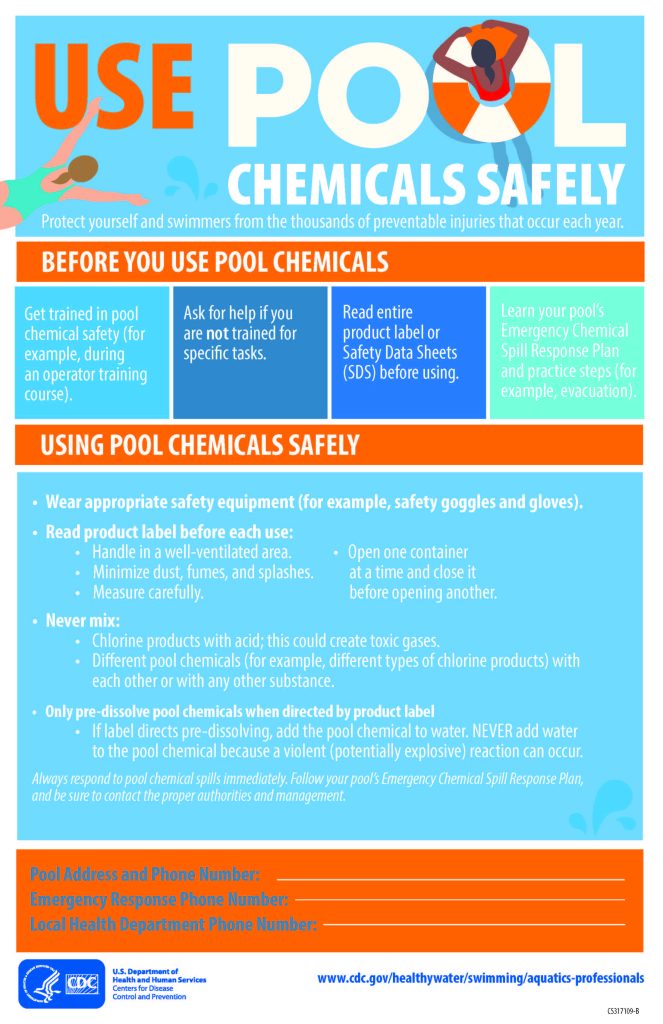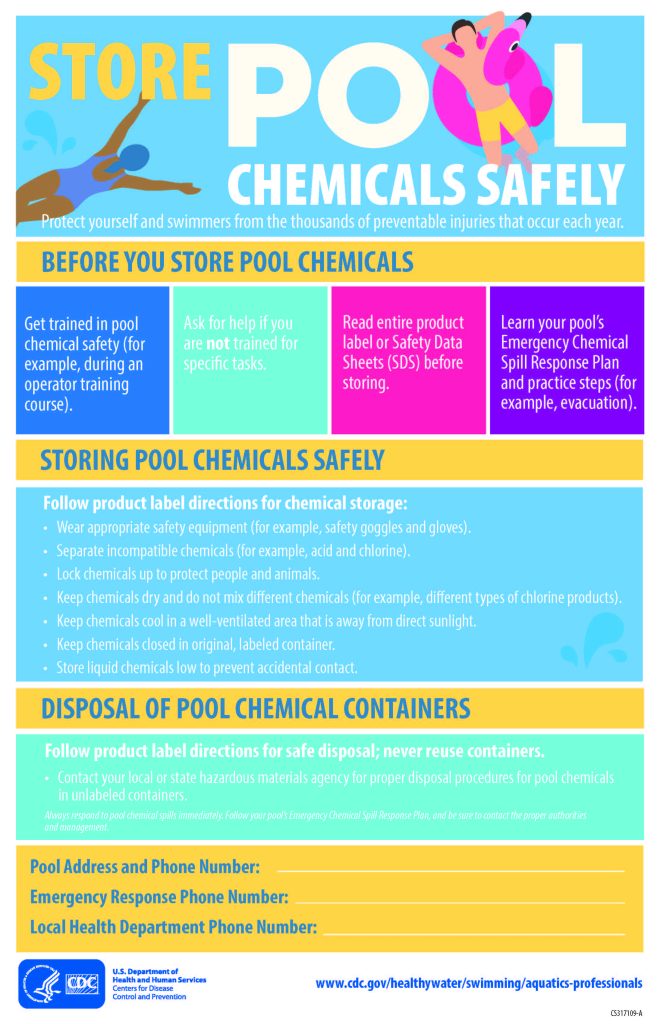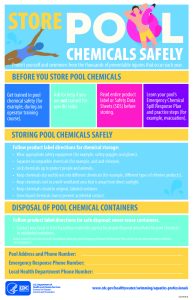Call Poison Control or 911 if you or someone is in danger. This may include chemicals in the eye, on skin, or directly inhaled chemical dust or vapors.
Pool chemicals are used to help protect swimmers by disinfecting water and killing germs that may cause disease. However, if used or handled improperly, pool chemicals can be harmful. Pool chemicals can injure people when mixed together or when appropriate personal protective equipment (PPE) is not used when handling them.
Pool chemicals may include:
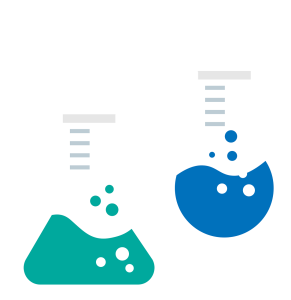
- Chlorine
- Bromine
- Salts
- Acids or Bases
- Compressed gas
- Sanitizers and Disinfectants
Pool chemicals can cause injury to:
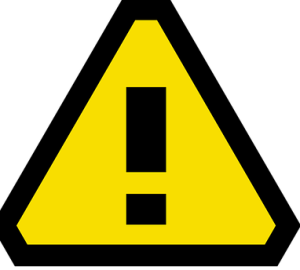
-
-
- Skin
- Eyes
- Respiratory tract
- Digestive system
-
Pool chemicals can come in contact with people by:

-
-
- Direct contact
- Inhalation
- Dust
- Contamination of food or drink
-
Pool owners or Facility Operators should be knowledgeable of all of the chemicals used and stored onsite. If you have any questions about the chemicals used at a pool, ask the owner or operator. Facilities should have written procedures on how to handle chemicals safely and trained staff.
Click on the buttons below to learn more about Chemical Safety.
Residential Pools
- Always read the manufacturer's instructions on the label.
- Always wear personal protective equipment (PPE) as directed on the chemical label.
- PPE may include:
- Safety glasses or goggles
- Face shield or mask
- Gloves
- PPE may include:
- Only mix chemicals as directed on the manufacture's label.
- Add chemicals to water - not water to chemicals.
- Improper mixing can result in a reaction and may cause toxic gas, fire or an explosion.
- NEVER add pool chemicals when the pool is in use, and only add them poolside as directed by the product label.
- Designate tools per chemical - Do not use the same scoop for different chemicals. It might cause a reaction!
- When in doubt, call your pool maintenance professional!
Commercial or Public Pools
- Only handle chemicals if you have been properly trained.
- Always read the manufacturer's instructions on the label.
- Always wear PPE as directed on the chemical label.
- PPE may include:
- Safety glasses or goggles
- Face shield
- Gloves
- Aprons
- Respiratory protection
- PPE may include:
- Only mix chemicals as instructed.
- Many pool chemicals are incompatible with each other.
- Improper mixing can cause fire, explosions, or toxic gas.
- Even old chemicals mixed with new chemicals can react.
- As chemicals get old, they degrade and change their chemical composition.
- Don’t mix old chemicals with new chemicals, even if they are labeled as the same kind.
- Add chemicals to water - not water to chemicals.
- Improper mixing can result in a reaction and may cause toxic gas, fire or an explosion.
- Designate tools per chemical.
- Do not use the same scoop for different chemicals. It might cause a reaction!
In General
- Always read the manufacturer's instructions on the label.
- NEVER add pool chemicals when the pool is in use, and only add them poolside as directed by the product label.
- Check expiration dates! Make sure chemicals are not expired before use!
- Do not eat or drink near chemicals.
Residential Pools
- Store chemicals in secure location away from children and pets.
- Store chemicals in a cool, dry location and away from direct sunlight.
- Never store liquid chemicals above dry chemicals.
- Make sure the area where chemicals are stored is well ventilated.
- Store chemicals in their original containers. Do not reuse containers.
- Don’t store chemicals with other equipment (lawn mowers, leaf blowers, etc.).
Commercial or Public Pools
- Keep unauthorized persons away. Keep chemical storage room doors labeled and locked.
- Ventilation in pool chemical storage rooms is very important. Make sure the chemical storage room is well ventilated.
- Keep chemicals dry.
- Make sure chemicals are in waterproof containers or otherwise will not get wet.
- Watch out for rainwater, leaks, wet floors, sprinklers, high humidity or anything else that might cause chemicals to get wet.
- Make sure chemical containers are in good condition and are not damaged, broken or leaking.
- Make sure chemical containers are properly labeled.
- Store different chemicals separately.
- Never store liquid chemicals above dry chemicals.
- Store chemicals off of the floor and away from windows and doors. Keep out of direct sunlight.
- Keep floors clean. Make sure floors are sloped to drain and that drains are clear and working.
- Store safety equipment separate from chemicals.
In General
- Make sure chemical containers are in good condition.
- Do not reuse chemical containers.
- Avoid accidental mixing of chemicals.
- Don’t store chemicals with other equipment.
- No SMOKING in chemical storage areas or while using chemicals.
Residential Pools
- Read chemical labels prior to use.
- Make sure you have all of the equipment described on the label prior to using chemicals.
- Always have personal protective equipment (PPE) available for use.
- Practice using PPE.
- Make sure PPE fits, is clean and in good condition.
- PPE may include:
- Safety glasses or goggles
- Face shield or mask
- Gloves
Commercial or Public Pools
- Have chemical Safety Data Sheets (SDS) sheets properly stored and accessible.
- Know where the SDS are and study them!
- The SDS contain valuable information about specific chemicals, such as:
- How to handle chemicals
- How chemicals may react
- Health effects of chemicals
- What kind of PPE to use
- How to clean up spills
- What to do if people have been exposed to the chemical
- The SDS contain valuable information about specific chemicals, such as:
- Always have PPE available for use.
- Have the appropriate PPE on site as directed on the chemical labels.
- Practice using PPE.
- Make sure PPE fits the person who will be using it.
- Keep PPE clean, readily available and in good condition.
- PPE may include:
- Safety glasses or goggles
- Face shield
- Gloves
- Aprons
- Respiratory protection (maks, respirators, gas masks)
- Other safety equipment may include:
- Eye wash station
- Chemical shower
- First aid kit
In General
- Call Poison Control or 911 if you or someone is in danger. This may include chemicals in the eye, on skin, or directly inhaled chemical dust or vapors.
- Read chemical labels prior to use.
- Make sure you have all of the equipment described on the label prior to using chemicals.
Residential Pools
- Try not to spill chemicals. If you do, take extra care to make sure they aren’t mixed with other chemicals, trash or debris during cleanup. If they are accidentally mixed, it could cause a reaction.
- Follow cleanup instructions outlined on the chemical labels.
- Use proper materials and equipment for cleanup. This may include absorbent pads, absorbent granules or other chemical specific materials.
- Make sure there are proper clean up materials stored nearby.
- When in doubt, call your pool maintenance professional!
- If in an emergency, Call 911.
Commercial or Public Pools
- Try not to spill chemicals. If you do, take extra care to make sure they aren’t mixed with other chemicals or debris during cleanup. If they are accidentally mixed, it could cause a reaction.
- Follow cleanup instructions outlined on the chemical labels or SDS.
- Use proper materials and equipment for cleanup. This may include absorbent pads, absorbent granules or other chemical specific materials.
- Make sure there are proper clean up materials stored on site.
- Have an Emergency Chemical Spill Plan.
- Practice cleaning up spills with an instructor, supervisor or certified person on site.
- Have EMS/Fire/Emergency Response contact information posted near chemical storage areas.
- Know your location and the chemicals used when calling for assistance.
In General
- Try not to spill chemicals.
- Be careful with chemical cleanup.
- Follow cleanup instructions outlined on the chemical labels
- When in doubt, ask for help.
- If there is an emergency, Call 911.
Residential Pools
- Have a plan for emergencies.
- Make sure your family and friends know the emergency plan.
- Know who to call and how to notify them of where you are:
- In the event of an emergency, Call 911.
- Provide your name and address for emergency response.
Commercial or Public Pools
- Have an emergency plan in the event of:
- Spills
- Cross contamination
- Toxic gas
- Fire or explosion
- Human exposure or injury
- Other events specific to your location or as identified by management
- Have an Evacuation Plan.
- Have EMS/Fire/Emergency Response contact information posted.
- Know the address of your location for emergency response.
In General
- Be aware of your surroundings.
- Know where you are (name of place, address, city, state)
- Know where the exits are.
- If you see something - say something.
- In the event of an emergency, call 911.
-
Visit the CDC Pool Chemical Safety webpage for more information.
-
Read the EPA Safety Alert “Safe Storage and Handling of Swimming Pool Chemicals” (2001)
-
Read the EPA Chemical Emergency Preparedness and Prevention Advisory on SWIMMING POOL CHEMICALS: Chlorine.
-
Watch the Chlorine Institute and the American Chemistry Council pool chemical safety video
-
Swimmer Chemical Safety Check!
-
- Look:
- Make sure you can see the bottom of the pool. Cloudiness is both gross and increases the likelihood of drowning for young swimmers!
- Smell:
- Make sure there are no strong chemical smells, which is not a sign of proper chlorination, but rather a sign of contamination.
- Check:
- Ask to see the water quality results posted at every public pool.
- Look:
-
-
If someone has been exposed to pool chemicals:
-
- Remove the person from the source. Move them to an open and well ventilated area.
- Seek assistance from the lifeguard, pool owner or operator.
- Follow instructions on chemical labels or SDS.
- Seek supportive care - call 911 or poison control if necessary.
-
-
QUICK SAFETY TIPS

- Stay away from chemicals.
- Improper use or storage of chemicals can result in cross contamination or degradation of chemicals. This can lead to fire, toxic vapors, or even explosions.
- Chemical misuse can result in personal injuries, swimmer injury, or damaged equipment.
- Do not handle chemicals if you have not been trained to do so.
- Do not splash chemicals with water or other liquids.
- Do not eat or drink near chemicals.

